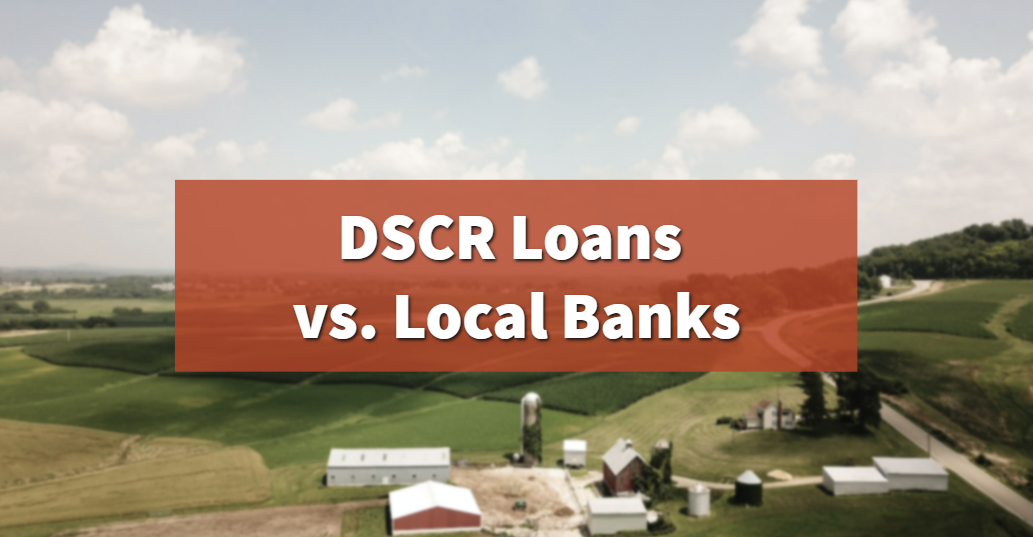DSCR Loans vs. Local Banks
Categories: Blog Posts
Should you look for DSCR loans or are local banks going to have what you need?
Whenever we’re talking about rentals, we’re always going to come back to cash flow, and it’s important to find the best cash-flowing loan.
We want to look at the pros and cons of each type of rental loan to help you understand which might be the best option to help your cash flow for a specific deal.
DSCR Rental Loans
DSCR stands for debt-service coverage ratio. You’ll often see these loans come up for anything from a single family home to a larger multi-unit property.
Pros of DSCR
1. Flexibility. While traditional loans find strength in their consistency, investors sometimes find themselves needed a lot more flexibility. That’s where DSCRs come in.
DSCRs are significantly more flexible because lenders and investors can negotiate unique terms that fit a project’s specific needs.
2. Ease! The biggest benefit of DSCR is ease. It doesn’t matter if you’re employed, what your tax return says, or how much income you have flowing. DSCR lenders only care about the rental property and whether it has the potential to produce cash flow.
3. Close in an LLC. Another big thing in the real estate investor world is closing in an LLC. Unlike traditional bank loans, you can both buy and refinance in an LLC, so you’re protected all the way through.
4. Available in all 50 States. No matter where you are, you will be able to find available DSCR rental loans. However, the details might vary.
Each lender offering DSCRs have their own terms, guidelines, etc. This makes it incredibly important to shop around to make sure you find the right fit.
5. Unlimited Number of Properties. You will find so many options in the DSCR world. You can find loans for specific properties or do a blanket loan for $50 million that could cover as many units as you wanted.
Always make sure that the lender and loan are the right fit for you, and remember that there are a ton of options available!
Cons of DSCR
1. Prepayment Penalties. The number one downside of DSCR loans are the prepayment penalties. If you’re looking to get in and out of a property within the first three to five years, there’s a prepayment penalty unless you buy it out.
2. Higher Rates. Rates for DSCRs typically run anywhere from 1%-3% higher than traditional bank loans, depending on credit score, size of loan, etc.
3. Might Disappear or Change Quickly. DSCR loans are prone to change quickly. When shifts happen in the real estate market, they might even disappear for a brief time before showing up again.
While traditional bank loans are more slow-moving, DSCR moves quickly, and sometimes that can become an issue to real estate investors.
4. Can’t Home Hack. DSCR also does not allow you to live in any of the units you’re working on as you could with an owner-occupied traditional loan.
Local Banks for Rental Loans
Another option that fewer people consider is looking at loans from small, local banks. These local banks sometimes offer in-house products that can offer more flexible loans to people investing in their local area.
Pros of Small Bank Loans
1. More Flexibility. Depending on your area, some local banks love real estate investors. If you shop around and find a small bank willing to invest, these loans often offer more flexibility than larger traditional loans.
Because local banks are more likely to understand the area, unique properties that might seem strange to larger lenders might be more seriously considered by locals.
2. Decent Rates. Rates for local banks typically fall between traditional loans and the higher DSCR rates. However, you do keep more flexibility (the appeal of DSCR) for a lower rate.
3. No Prepay Penalties. Most local banks don’t have the extensive prepay penalties like DSCRs.
4. Good for Smaller Towns and Loans. Banks often want to invest in their local areas, and they’re often more willing to give out smaller loans for those areas as well. Of course, these banks still want to see good income and good credit.
Cons of Local Bank Loans
1. Each is Different. Every small bank makes their own rules. Because of this, its so important to shop around to find a bank that will offer you good rates for your specific project.
2. Lending Limits. Local banks also have lending limits. If you’re putting a portfolio together or doing multiple properties, you might hit up against that lending limit, and the bank might have to step away from offering you a loan.
3. Shop Around. As we already mentioned, one of the big negatives is you have to shop around. Small bank loans can also change like DSCR loans, so just because you talked to a bank at one point doesn’t exclude them from being considered again in the future.
4. Limited Areas/Regions. They also limit their areas and don’t want to go too far out of that market. Look for banks in the local area of your investment property.
5. Callable. Loans from small banks are callable. This means that, if they feel like the values have gone down, they could call the loan and make you pay it off or refinance it somewhere else. Neither traditional nor DSCR loans have this feature.
This gives small bank loans a bit more risk than other types of rental loans.
Read the full article here.
Watch the video here:











